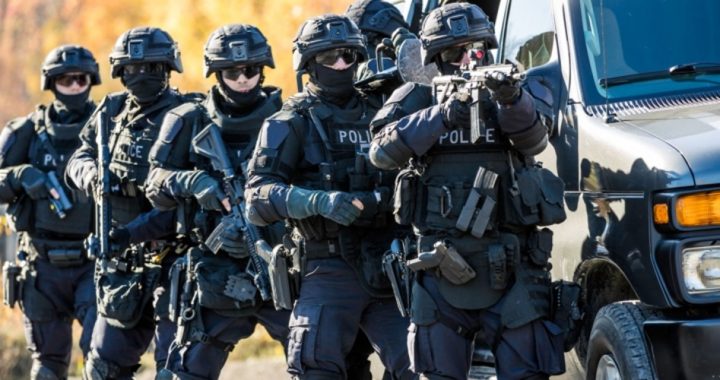
Over the past several years — as a result of the “war on drugs,” and now the “war on terror” — police departments across America have increasingly taken on the appearance of a military force, rather than a local law-enforcement agency. This has not happened by spending with local tax dollars; rather, it has been driven by a policy in which federal government agencies share “surplus” military-grade equipment with local police departments.
Two bills have been introduced in the Maryland Legislature in an attempt to address this situation. House Bill 138 and Senate Bill 210 would each require any law-enforcement agency in the state to report the acquisition of equipment under the federal military surplus program within two weeks on a website that is accessible by the general public. The governor and the Maryland General Assembly would also be notified.
While not actually outlawing the acquisitions, at least the bills happening would “raise awareness” (using a popular phrase) in communities when their local police are being transformed into soldiers rather than peace officers. This, in turn, could lead to future legislation to restrict the practice.
The Department of Homeland Security (DHS) can turn over military-grade weapons to local police departments, bypassing any approval from state governments, through the Homeland Security Grant Program. Among the types of weapons obtained by local police are tactical vehicles, drones, and even tanks. Exactly why a local police department would need such weapons of war is not clear.
Unfortunately, President Donald Trump supports the program, and even issued an executive order during his first year in office rescinding previous efforts at transparency and oversight of the transfer of military equipment.
Writing for the Tenth Amendment Center, Mike Maharrey offered an explanation as to why Americans should be concerned about this program: “Arming ‘peace officers’ like they’re ready to occupy an enemy city is totally contrary to the society envisioned by the Founders. They’ve turned ‘protect and serve’ into ‘command and control.’”
While some moves were made in this direction in the 1980s with the federal “war on drugs,” the militarization of local police accelerated after the 9/11 attacks, all in the name of the “war on terror.”
In addition to changing the character of the local police department from one that serves the local community into more of a military-style force, police militarization is problematic for other reasons. For one thing, local police departments become more dependent upon the federal government, loosening them from both local control and state supervision. This is highly unhealthy for a federal system of government in which all powers not given to the federal government are reserved for the states.
Control over local law enforcement is among the powers reserved to the states under our federal system. This is why the campaign of the John Birch Society (parent organization for The New American) known as “Support Your Local Police” adds the words, “And Keep Them Independent.” The nationalization of law enforcement is antithetical to limited government. There are several examples of police nationalization’s deleterious effects to individual liberty that could be cited, but Adolf Hitler’s nationalization of the law enforcement with his infamous Gestapo should suffice.
Many conservatives and libertarians like to tout nullification as a way to rein in an over-reaching federal government. Under nullification, a state simply refuses to cooperate with the federal government in some area, making implementation of a federal program difficult or even impossible. Nullification can, in some cases, be quite effective at preserving the rights of the states in the federal system.
However, as in the case with the federal government handing over surplus military equipment to local police agencies, it is the state and local governments that are complicit in their own loss of control. Money talks, and state governments have become so addicted to “federal money” that about one-third of their budgets are now funded by that federal largesse.
Local and state governments have become dependent upon the federal government. When local police departments receive “free” equipment from the federal government, it is only logical that they will be more likely to carry out federal directives rather than risk losing the “free stuff.”
Such militarization can transform local police into warriors. After all, police do not need a tank or a drone to control traffic or arrest someone who has just held up a liquor store. You need a tank to fight a war.
Image: Onfokus via iStock / Getty Images Plus




